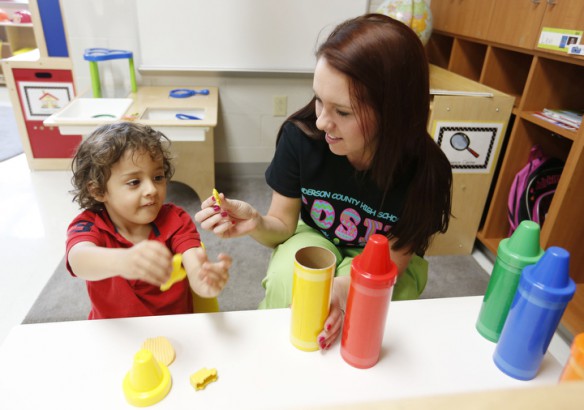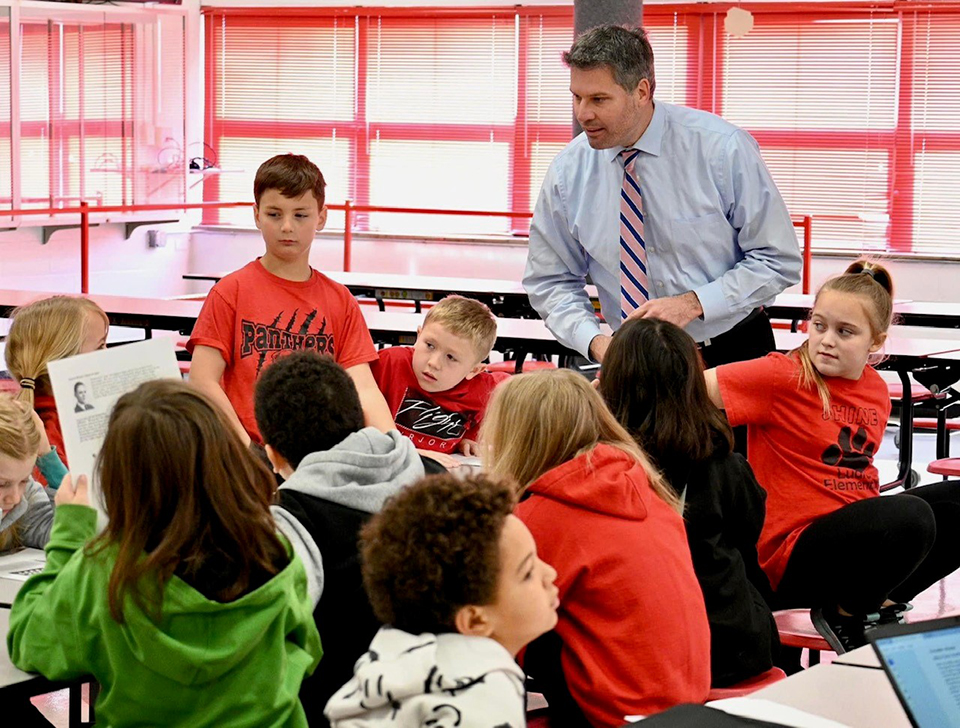
Senior Cammy Hester works with Romeo, a 3-year-old student, at the Thelma B. Johnson Early Learning Center as part of HCHS’s Early Childhood Education program.
Photo by Amy Wallot, May 11, 2015
By Brenna R. Kelly
Brenna.r.kelly@education.ky.gov
When Emily West came to Henderson County’s Early Childhood Education program nine years ago, she could see the future.
“I always had a vision,” said West, a family and consumer science teacher who took over the high school program in 2006. “I knew that the early learning center would eventually be opening.”
The Thelma B. Johnson Early Learning Center, which opened in 2012, and West’s initiative have transformed Henderson County High School’s 45-year-old early childhood education program into a nationally recognized leader in career and technical education. It recently was named as one of nine Excellence in Action winners by the National Association of State Directors of Career Technical Education Consortium (NASDCTEc). The award recognizes career and technical education programs that take inventive and effective approaches to stimulating student learning, offer extensive work-based learning experiences and increase student postsecondary and career prospects.
The program also was honored at the White House in June as part of a Celebrating Innovations in Career and Technical Education event.
“Being at the White House was an amazing experience. I felt honored to be recognized as a CTE innovator nationwide with the other amazing teachers,” West said. “It was a great experience to hear Michelle Obama speak about the importance of CTE. I felt so privileged to be sitting in the audience representing CTE teachers across the nation.”
For West, the award is proof that career and technical education is finally receiving the recognition that it deserves as the need for educated, skilled workers increases across the state and nation.
“I only see CTE getting bigger and more important,” said West, who was named a semifinalist for Kentucky Teacher of the Year in 2014.
West said the demand for highly trained early childhood educators will only increase as the push to expand preschool to more students and the focus on high-quality early childhood education continues.
“Kentucky really understands the importance of early childhood education, which a lot of other states aren’t yet on board with,” she said. “Kentucky is really pushing for high-quality early childhood education, which is one reason why the early learning center opened up.”
The Johnson Center houses the district’s preschool and kindergarten and was built with the early childhood education program in mind. It includes a classroom for the high school students and West’s office. After a nine-week training program, students in the senior-level early childhood class spend four days a week working in preschool classes at the center.
“They are basically considered an assistant in the classroom, in which they have to develop their own lesson plans, implement them and then reflect on them,” West said.
Last school year, 274 students participated in the program. High school students begin with the early lifespan class, then move on to a services class that teaches them about the administrative side of daycare, preschool and elementary school. Students also complete a capstone project, which includes a research paper, activity and presentation designed to integrate academic knowledge and career and technical skills.
Students can graduate with up to three industry-recognized certifications. All students receive the Orientation of Early Care and Education Professionals career-ready certificate, which is state-mandated training for childcare workers. West became a certified instructor to make it more convenient for her students to receive the training.
“Before, I had to have someone come in and give them the six-hour training,” she said. “That made it very difficult to schedule.”
Students also receive the Commonwealth for Childcare Credential of Eligibility, for which students must receive a minimum of 60 hours of instruction in early childhood education. This shows employers that they have increased knowledge of the field.
The third certification is the optional Child Development Associate (CDA), a national credential required of most childcare workers. West was the first family and consumer science teacher in the state to have students receive the certification.
“It’s a lot work for the student,” she said. “They have to obtain 480 hours of working directly with children.”
While students rack up 175 hours working at the preschool for three periods during the school day, West said they must complete the remaining hours on their own and the work must be unpaid. Students also must complete a portfolio, take a two-hour test and sit for a one-hour interview to earn the CDA credential.
“Those are the students who are highly motivated and want this credential because that credential translates into college credit hours,” West said.
Students who receive the CDA credential get nine credit hours from the Kentucky Community and Technical College System and 12 credit hours at the University of Kentucky.
Bridget Murray, the program coordinator for the Interdisciplinary Early Childhood Education program at Henderson Community College, serves as the student’s professional development specialist and observes their teaching as part of the credentialing requirements.
“If it wasn’t for Bridget, my students wouldn’t have the CDA,” West said.
One hurdle for students was the $425 required CDA assessment fee, West said. However, the high school and the Henderson Early Childhood Community Council has covered the costs for the past several years, she said.
Four of the 20 students in West’s senior class last year received the CDA credential.
Students who complete the program are not only ready to work in childcare facilities, but also have a foundation to help them purse a college degree in either early childhood education or elementary education, West said.
For a family consumer science program to be held up of an example of a CTE program that works is especially gratifying for West, who has two master’s degrees, including one in family and consumer science.
“Some people still view family and consumer science as home economics,” she said. “But it has come a long way from home economics.”
The national recognition is also good for career and technical education in Kentucky, which is seeing renewed attention, she said. In the 2014-15 school year, almost 70 percent of Kentucky high school students participated in career and technical education, according to state data.
“I believe we are the future,” West said. “We are the vision and we need to be graduating students who have the background, skills and credentials for the jobs in Kentucky.”
FOR MORE INFO …
Emily West Emily.West@henderson.kyschools.us




Leave A Comment